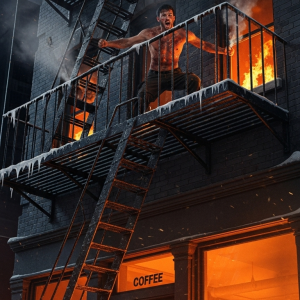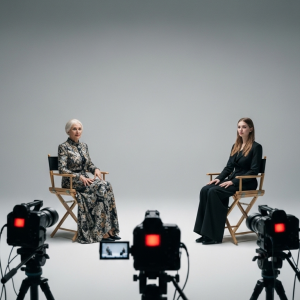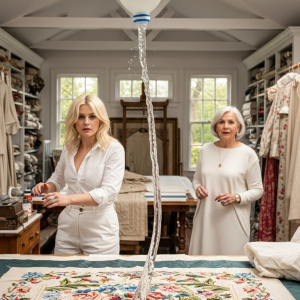The silence in the Harrison family mansion was a currency richer than any stock in their portfolio. It was a heavy, suffocating silence, punctuated only by the distant chime of a grandfather clock and the clinking of ice in a crystal glass. Clara, in her simple cotton scrubs, felt the weight of it every time she returned home from a 12-hour shift in the ICU.
Her siblings, Richard and Susan, were masters of this silence. They wielded it like a weapon, their disapproval of her career path echoing in every unsaid word. To them, she was an anomaly, a strange bird who had willfully flown from their gilded cage to nest in the messy, chaotic world of medicine.
“Honestly, Clara, I don’t know how you do it,” Susan said one evening, swirling a deep red Bordeaux in her glass. She was perched on a velvet armchair, looking every bit the socialite she was. “All that… unpleasantness. Bodily fluids. It’s hardly dignified.”
Richard, sharp and predatory in a tailored suit that probably cost more than Clara’s car, didn’t even look up from his tablet. “It’s a blue-collar job in a white coat, Susan. Let’s not romanticize it. While we’re building empires, Clara is… changing bedpans.” The dismissiveness in his tone was a familiar sting.
Clara gripped her mug of tea, the warmth a small comfort. “I help people, Richard. I save lives.”
“A noble sentiment,” he retorted, a smirk playing on his lips. “But nobility doesn’t pay for a Hamptons estate.”
Only their father, Arthur Harrison, saw things differently. A self-made titan of industry, he had a respect for hard work that his two eldest children had never inherited. He often told Clara that her hands, though calloused and often sanitized, were the most valuable in the family.
One rainy afternoon, years ago, he had sat with a ten-year-old Clara in the grand library, a small brass telegraph key between them. He had been a radio operator in his youth, a fact his other children found unglamorous and forgot.
He tapped her hand gently. Dot-dot-dot. Dash-dash-dash. Dot-dot-dot. “S-O-S,” he had whispered, his eyes twinkling. “This is Morse code, my little nightingale. A secret language. This will be our special way of communicating, for when others are too loud to listen.” It became their game, a silent bond woven in dots and dashes that was theirs alone
The inciting incident arrived not as a dramatic explosion, but as a jarring phone call that shattered a quiet Tuesday morning. Arthur Harrison, a man who had commanded boardrooms and bent markets to his will, had been felled by a massive stroke. He was alive, the doctors said, but the storm inside his brain had left him shipwrecked in his own body.
The hospital became the new battleground. The sterile, antiseptic smell of the ICU was Clara’s world, but for Richard and Susan, it was an alien landscape. Clara moved with purpose, speaking the language of ventilators and vital signs, her mind a focused whirlwind of treatment plans and patient care. She was a professional, a healer.
Her siblings were… something else entirely. They stood awkwardly by the window of the private room, their expensive clothes looking garish and out of place against the pale green walls. While Clara was conferring with neurologists, she overheard their hushed, urgent whispers.
They weren’t discussing their father’s prognosis. They were discussing his portfolio.
“The market is volatile. We need to get power of attorney immediately,” Richard’s voice was a low, urgent hiss. “We can’t let his assets sit idle.”
Susan, her face a mask of strained concern that didn’t quite reach her eyes, nodded. “And the will… everything needs to be in order.”
Then came the moment that froze the blood in Clara’s veins. Richard glanced at his father’s still form, a flicker of something cold and calculating in his eyes. He lowered his voice, but not enough. “Good thing Dad signed that new will last month. It will make everything… simpler.”
Clara felt a sickening lurch in her stomach. A new will? Her father had never mentioned it. He had always been a man of consistency and tradition. The comment felt wrong, a discordant note in an already tragic symphony. At that moment, she saw her siblings not as family, but as vultures circling, waiting for the lion to finally fall.
The days that followed blurred into a monotonous cycle of grief and duty. Richard, with chilling efficiency, began the process of executing their father’s “final wishes.” He produced a freshly drafted will, signed and dated just four weeks prior. It was a clean, brutal document.
The vast Harrison estate, the companies, the stocks, the properties—all were to be divided equally between Richard Harrison and Susan Harrison-Clarke.
For Clara, there was a small trust fund, a pittance designed to “provide for her modest needs.” Richard had presented it to her with a patronizing air of generosity, as if he were doing her a great favor. “Dad wanted to make sure you were always taken care of, of course,” he had said, his voice smooth as polished marble.
The document felt like a final, posthumous insult, but Clara had no energy to fight. Her focus was on her father. She spent every spare moment at his bedside, holding his limp hand, talking to him, reading to him, even when there was no sign he could hear. The only part of him that seemed to have any life left was his right hand, where his fingers would occasionally twitch.

One quiet afternoon, as the setting sun cast long shadows across the room, she was holding that hand. She felt a faint, deliberate pressure against her palm. A light tap. Then another. And another.
Tap. Tap. Tap.
She dismissed it at first as an involuntary muscle spasm, a common neurological echo of the stroke. But then it came again, a distinct, rhythmic pattern.
Tap… Tap… Tap… (S) Tap-tap-tap… (O) Tap… Tap… Tap… (S)
Her breath caught in her throat. S-O-S. The first signal he had ever taught her.
A jolt went through her, electric and terrifying. She looked at her father. His eyes were closed, his face slack, but his fingers, hidden from anyone else’s view, were alive with purpose. It wasn’t a spasm. It was a message.
Over the next few days, it became their secret ritual. She would hold his hand, her thumb gently stroking his knuckles, and he would reply with painstaking effort. The taps were weak, the pauses agonizingly long. She had to pretend to be reading a magazine, a notepad hidden in its pages where she frantically scribbled down the letters.
The message emerged, letter by agonizing letter, a testament to her father’s unbreakable will.
N. E. W. W. I. L. L. F. A. K. E.
The words made her heart hammer against her ribs. She felt a surge of vindication, followed by a wave of cold fear.
The tapping continued the next day, each press a monumental effort for the trapped titan.
R. I. C. H. A. R. D. F. O. R. G. E. D.
Clara had to fight to keep her composure, to prevent the sob that was building in her chest from escaping. The final part of the message was the hardest to decipher, his exhaustion clear in the fading strength of the taps.
R. E. A. L. W. I. L. L. I. N. O. L. D. C. L. O. C. K. L. I. B. R. A. R. Y.
The grandfather clock. The one that chimed the hours away in the cavernous, silent library of their home. A place her siblings never entered. It was their secret, now her salvation.
The meeting was set for Friday at the downtown offices of a prestigious law firm. The air was thick with the scent of old leather and new money. Richard was in his element, exuding an aura of smug control. Susan, dressed in a somber but impeccably tailored black dress, looked impatient, ready for the formalities to be over so her new life could begin.
They were all seated around a vast mahogany table when the door opened. Clara walked in.
She was not late by accident. Her entrance was timed, her expression calm and unreadable. She wasn’t wearing scrubs or a fancy dress, but a simple, professional blouse and slacks. In her hands, she held not a purse, but an old, polished wooden box—the very box where her father had kept his telegraph key.
Richard’s brow furrowed in annoyance. “Clara, we were about to begin. Your presence is noted, but this is a formality.”
Clara said nothing. She walked to the table and placed the box down with a soft, definitive thud that seemed to echo in the silent room. She slowly opened the lid. Inside, nestled on a bed of faded velvet, was not a telegraph key, but a thick, cream-colored envelope sealed with her father’s distinctive wax signet.
She finally met her siblings’ eyes, her gaze steady and clear.
“Before we proceed,” she said, her voice quiet but ringing with absolute authority, “I think we should read the will my father directed me to. He cannot speak, but he has not been silent.”
A stunned silence fell over the room. The head lawyer, a stern man named Mr. Abernathy, looked from the new document to the one Richard had provided, his expression hardening with professional gravity. He picked up the sealed envelope, examining it under the light.
“The seal is authentic,” he murmured, more to himself than to anyone else. “And this is indeed Arthur Harrison’s signature, verified by our records. The date… this one is dated six months ago. It legally supersedes the document Mr. Harrison has presented.”
Richard shot to his feet, his face draining of all color. “That’s impossible! It’s a trick! She’s manipulated him in his state!”
Mr. Abernathy ignored him, carefully slitting open the envelope. He cleared his throat and began to read.
The will was a masterpiece of Arthur Harrison’s true character. It began with a heartfelt passage about his pride in his daughter Clara, whose compassion and dedication he considered his greatest legacy.
Then came the hammer blow.
“To my son, Richard, and my daughter, Susan,” Mr. Abernathy read, his voice devoid of emotion, “whose ambition has eclipsed their compassion and whose love of money has replaced their love of family, I leave the sum of one dollar each, so that it may never be said I left them with nothing.”
Susan gasped, a strangled, ugly sound. Richard stood frozen, his mouth agape, his carefully constructed world shattering around him.
The will continued, outlining its primary purpose. The entirety of the Harrison fortune—every stock, every property, every last dollar—was to be placed into a newly formed charitable foundation. The Harrison Foundation for Compassionate Care. Its mission: to fund hospitals, create nursing scholarships, and advance medical research for the public good.
Mr. Abernathy paused, then read the final, devastating sentence.
“And as the sole lifelong Chairperson and executor of this foundation, with full and uncontested control of its assets, I appoint my daughter, Clara Harrison.”
The room fell away. But Mr. Abernathy had one last thing to add, looking directly at a ghostly white Richard. “Mr. Harrison,” he said, his tone now ice. “The document you filed with this office appears to be a forgery. That is a federal crime. Given this new, authenticated will, I am legally obligated to report this matter to the district attorney’s office. You will be facing serious criminal charges for fraud.”
Richard finally collapsed back into his chair, not just disinherited, but destroyed. His own greed had not only cost him a fortune; it had paved his path to a prison cell.
Six months later, the Harrison Foundation was in full operation. Clara didn’t move into a penthouse office or trade her sensible car for a luxury vehicle. She ran the foundation from a modest, light-filled office, the old wooden box with the Morse code key sitting proudly on her desk.
Her first act as chairperson was to move her father to the finest long-term neurological care facility in the country, a place of hope and innovation. She used the family’s vast resources not for herself, but to ensure the man who had given her everything was cared for with the dignity he deserved.
She poured her energy into the foundation, channeling her father’s vision into reality. She established scholarships for aspiring nurses from low-income backgrounds and funded a new critical care wing at the very hospital where she had once worked. She was no longer “just a nurse.” She was a force for good, wielding her power with the same compassion she had always shown her patients.
The final scene was not in a boardroom, but in a quiet, sunny room overlooking a garden. Clara sat beside her father’s bed, holding his hand. It was the same hand that had tapped a desperate message into her palm, the hand that had saved them both.
She leaned in close, and with her thumb, she gently tapped a message into his skin.
Tap… (I) Tap-tap-tap tap-tap-tap tap-tap-tap… (L-O-V-E) Tap-tap-tap… (Y-O-U)
A single, silent tear escaped the corner of Arthur Harrison’s eye and traced a slow path down his weathered cheek. He couldn’t speak, but he could listen. And he understood. Clara had proven that her “ordinary” profession was never a weakness. It was the source of her strength, the evidence of her empathy—the only inheritance her father had ever truly cared about.




